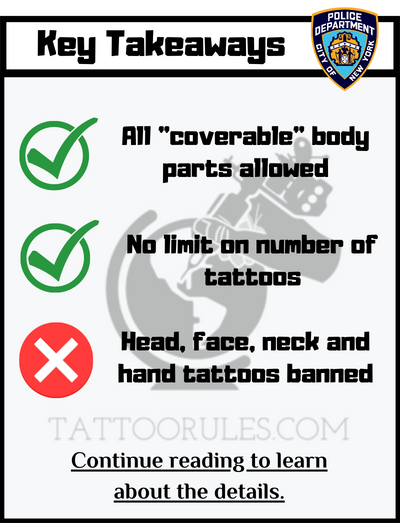Because tattoos are becoming increasingly popular, police departments are changing their policies to allow officers to have them.
Given that up to half of adult Americans are estimated to have at least one tattoo, it’s hardly surprising that the police have had to change their stance on tattoos. Otherwise, they’d be running out of potential recruits!
Because tattoos are not controlled by federal law, each police department is free to establish its own policy and restrictions. And, as one might anticipate, these policies differ greatly from one department to the next.
So, in comparison to other large police departments, is the NYPD tattoo policy lenient, moderate or strict?

Here’s what you should know.
NYPD Tattoo Policy
If you’re worried about applying to the NYPD because of your tattoos, don’t be. The state police department does not automatically dismiss applicants based on their body art.
As of now, the NYPD does not discriminate against folks with tattoos, which means that most people with ink are allowed to join the department. Having said that, NYPD is one of many departments around the country that restricts displaying visible tattoos while on duty.
This implies you can have tattoos in any area that would normally be covered by a uniform, such as your arms, legs, chest, and back. No-go tattoo zones for policemen in the NYPD are:
- head
- neck
- hands (in most cases)
The only allowed exception for a hand tattoo is a tattoo in the form of a band located on one finger on one hand. Such a tattoo needs to be small and can’t exceed 3/8 of an inch.
- Related: LAPD Tattoo Policy
The NYPD, like other police forces in the country, has specific rules regarding the content of tattoos. For example, department policy severely prohibits any tattoos affiliated with gangs, drugs, or racist organizations. Furthermore, officials are not permitted to get indecent or sexually explicit tattoos.
In general, the NYPD is more interested in the form and meaning of your tattoos than in their mere presence. However, it should be noted that the department reserves the right to reject any applicant – tattooed or not – if it considers they would be unable to fulfill their tasks professionally.
Tattoo Waiver a Possibility
Applicants with visible or hidden tattoos are examined on a case-by-case basis, and a waiver is allowed if the department believes you are otherwise eligible for the job.
To obtain a tattoo waiver, you must submit a written request as well as images of the tattoos in dispute. You must explain why you believe the department should grant you an exemption to the tattoo policy in your request.
Certainly, the department will inquire about the origins of your tattoos and why they are significant to you. They’ll also want to know if you’re prepared to cover them up while on duty (ie. with a band-aid or make-up).
Finally, it is important to note that the department reserves the right to request that you remove your tattoos at your own expense if they believe it is in the best interests of the department.
What To Expect Next
With the ever-evolving popularity of tattoos, the NYPD tattoo policy is likely to change in the future.
For now, the department is fairly lenient when it comes to body art – allowing officers to have visible tattoos as long as they are not located in certain restricted areas.
If you have tattoos and are interested in joining the NYPD, your best bet is to submit a written request for a tattoo waiver along with images of the tattoos in question. Be prepared to explain their origins and why you believe the department should grant you an exemption.
In case your tattoos are in the more “extreme” areas such as the head or neck, you should stay patient as the department’s policy on them is likely to change in the future. For now, you might want to consider getting them removed before applying to the NYPD.
If you’ve found this information useful, consider reading related articles: CIA tattoo policy, FBI tattoo policy & Coast Guard tattoo policy.
References:



